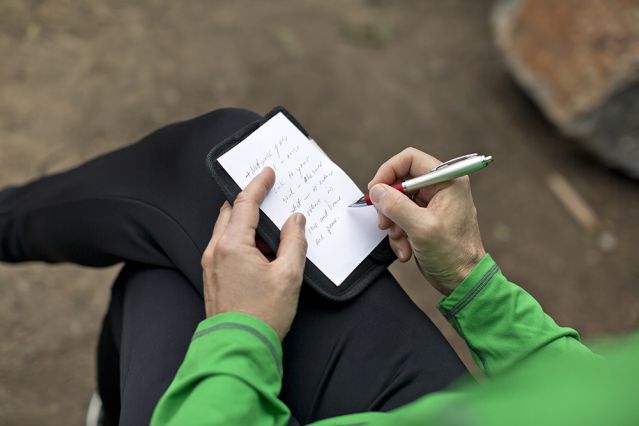Spirituality
Whole Health Approach Boosts Mental and Spiritual Well-Being
Resources to help you take steps to support your mental health.
Posted June 20, 2023 Reviewed by Michelle Quirk
Key points
- Adopting just one or two healthy habits can make a difference in your mental health each day and over time.
- Time spent outdoors is associated with improved cognitive function.
- Reducing stress can take the form of starting a daily meditation practice.

Is it possible to avoid stress?
When a health care provider suggested he “avoid stress” to reduce the symptoms of a health condition, Christopher pushed back. “What does that even mean?” he asked.
The provider laughed. “You’re right—it’s impossible to avoid stress completely!” she said. “Although, if you figure it out, here’s my cell phone number!” She meant “Do things that support a relaxed mental state, because that helps you physically.”
You can also take specific steps to support mental health. Activities that relax your physical body and connect your spirit to others and to nature can promote a calmer, more focused mind and better health.
Strictly speaking, some of what we call “stress” is actually positive—think graduating, getting married, or exercising enough to breathe hard. However, you are not helpless in the face of negative stress, and creating good mental health can increase your resilience in stressful times.
How to Create Better Mental Health
Adopting just one or two healthy habits and practices can make a difference in your mental health each day and over time.
Build emotional connections in person.
Have you lost touch with some friends and family since the pandemic? Maybe your favorite yoga studio closed or you’re working from home and seldom see the coworkers you used to chat with every day. Now is a good time to start reconnecting with friends and neighbors in person. Take a walk, get people together for a barbecue, or volunteer for a charity or event.
We know that making emotional connections can help you heal from trauma. And the relationships children have at school actually help them learn better in person.1 This can work for you in adult life, too. A community college course in Spanish helped LeeAnn make friends in a new city after her divorce, and Rodrigo has found key support among fellow veterans in a fly-fishing group.
Other ways to build emotional connections include holding in-person meetings at work (try a walking meeting!). Send your kids outside to play—their cousins and neighbors may be even more fun than TikTok once they get used to socializing away from screens.
It may even be time to buck the online exercise trend. Go walking or running with a friend before the day heats up. Isolation can lead to depression, which can lead you into a negative spiral and result in even more isolation.
Spend some time in nature.
As our electronic worlds expand, we risk becoming even more disconnected from the natural world. But it’s where we were originally meant to live, and summer can be a good time to explore. If it’s hot and humid, try the early morning or evening hours. Sit outside, feel the breeze, or go for a walk.
Time spent outdoors is associated with improved cognitive function, our capacity for thinking and remembering things. Spending time in nature also helps lower blood pressure, increase brain activity, and improve sleep.2
Researchers are now studying nature’s benefits in greater detail. How much? Where? For now, we simply suggest trying to get outside more and focusing on your surroundings rather than the work that’s back on your desk. Even if all you have time for is a walk to get lunch, outdoor time can relax and refresh you.
Take time to reflect and plan.
Taking time to seek out mental health support, such as searching for a counselor, is a good investment in your mental and physical health. You can also use journaling to reflect on what may be bothering you. At the How We Heal Campaign, we also offer some planning tools.
Jamiah, 42, set out last year to deliberately reduce stress in her life. She dropped several activities that were more of a burden than a pleasure or support. With her teen daughters, she cleared out the kitchen cupboards, getting rid of dishes and utensils the family never used. “It was amazing how not having to play the ‘Where’s the matching lid’ game with every reusable container made my life easier,” she says.
Most dramatically, she ended her nightly wine habit, with the goal of waking up clear-headed and refreshed. “I have a lot less stress, and I cope better with the things that do come up,” she says.
Reducing stress can take the form of starting a daily meditation practice, using guided imagery to cope with posttraumatic stress, or intentionally creating healing spaces within the walls of your home.
Consider the spiritual dimension.
Meditation, guided imagery, and creating a healing environment can help support a sense of meaning, purpose, and connection in your life. You may want to ask yourself, “What is my purpose?” or “Where do I find the most fulfillment?” Addressing such spiritual and existential questions can benefit mental health.
You don’t have to belong to a faith to explore your purpose in life or to connect with your own body, other humans, or nature. Finding these connections can provide a sense of stability and comfort that may help in navigating anxiety, depression, and physical conditions.
Attending to the spiritual aspects of life, whether in nature or a specific faith, has a positive impact on health and well-being. In fact, many medical students are now being trained to attend to whole person health with spiritual, but not religious, tools such as the FICA Spiritual History Tool to help assess well-being.
Start a conversation.
The most important message is this: Talk to someone. If you’re stressed, concerned about your mental health, or struggling with the big questions of existence, we encourage you to reach out. Healing rarely happens in a vacuum. Instead, it’s supported by relationships, a sense of connection, healthy habits, and healing surroundings. To create better mental and spiritual health, check out some of the resources below in the Reference section.
References
Resources
How We Heal Campaign. Resources for Mental and Spiritual Health. https://howwehealcampaign.com/resources/mental-and-spiritual-health/
When Things Fall Apart by Pema Chodron
1. Stringer, H. (2020, October 13). Zoom school’s mental health toll on kids. https://www.apa.org/news/apa/2020/online-learning-mental-health
2. Jimenez MP, DeVille NV, Elliott EG, Schiff JE, Wilt GE, Hart JE, James P. Associations between Nature Exposure and Health: A Review of the Evidence. Int J Environ Res Public Health. 2021 Apr 30;18(9):4790. doi: 10.3390/ijerph18094790. PMID: 33946197; PMCID: PMC8125471.
3. Ho, D. Y. F., & Ho, R. T. H. (2007). Measuring Spirituality and Spiritual Emptiness: Toward Ecumenicity and Transcultural Applicability. Review of General Psychology, 11(1), 62–74. https://doi.org/10.1037/1089-2680.11.1.62
4. Idler E, Blevins J, Kiser M, Hogue C (2017) Religion, a social determinant of mortality? A 10-year follow-up of the Health and Retirement Study. PLoS ONE 12(12): e0189134. https://doi.org/10.1371/journal.pone.0189134




